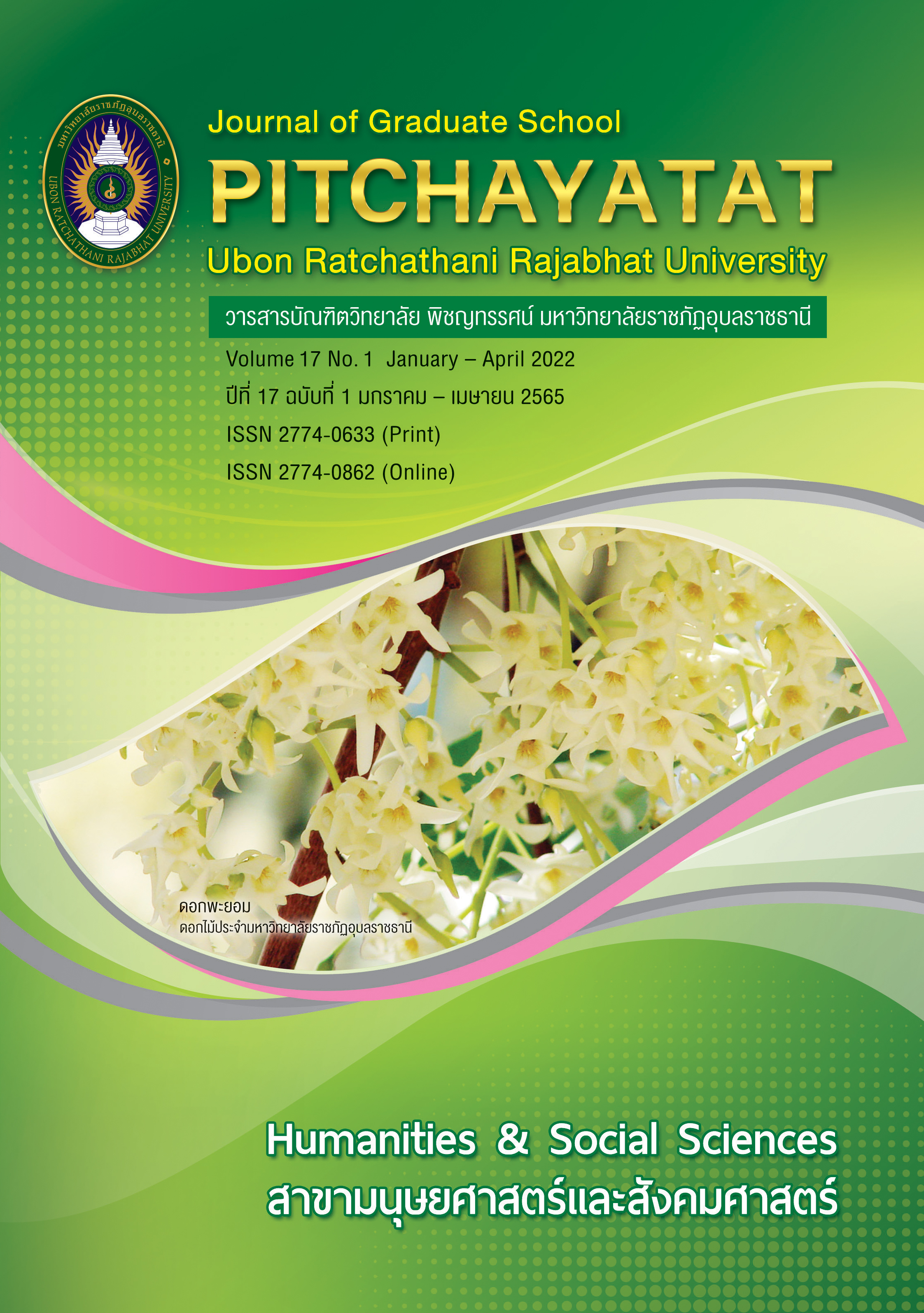ผลการจัดกิจกรรมการเรียนรู้ภาษาอังกฤษแบบเน้นคำศัพท์ โดยใช้กระบวนการคิดเชิงออกแบบต่อความสามารถทางคำศัพท์ ของนักเรียนชั้นประถมศึกษาปีที่ 5
บทคัดย่อ
การวิจัยนี้มีวัตถุประสงค์เพื่อเปรียบเทียบผลสัมฤทธิ์ของความสามารถทางคำศัพท์ของนักเรียนกลุ่มทดลองและกลุ่มควบคุมหลังจัดกิจกรรมการเรียนรู้ภาษาอังกฤษแบบเน้นคำศัพท์ โดยใช้กระบวนการคิดเชิงออกแบบ และวิธีการสอนแบบปกติ ตัวอย่างในการวิจัยครั้งนี้คือนักเรียนชั้นประถมศึกษาปีที่ 5 ภาคเรียนที่ 1 ปีการศึกษา 2564 ใช้วิธีการสุ่มแบบกลุ่ม) มีจำนวนห้องเรียนเป็นหน่วยของการเลือก ห้องนักเรียนกลุ่มทดลองและห้องนักเรียนกลุ่มควบคุม มีจำนวนห้องละ 29 คน เครื่องมือที่ใช้ในการเก็บรวบรวมข้อมูล คือ แบบทดสอบความสามารถทางคำศัพท์ก่อนและ หลังการทดลอง และแบบสังเกตพฤติกรรมของกลุ่มทดลองต่อการจัดกิจกรรมการเรียนรู้ภาษาอังกฤษแบบเน้นคำศัพท์โดยใช้กระบวนการคิดเชิงออกแบบ ในงานวิจัยครั้งนี้ใช้การคำนวณหาค่ามัชฌิมเลขคณิต ส่วนเบี่ยงเบนมาตรฐาน การทดสอบที และการวิเคราะห์เนื้อหา ในการวิเคราะห์ข้อมูล
ผลการวิจัยพบว่า
หลังการเรียนภาษาอังกฤษ โดยใช้กระบวนการคิดเชิงออกแบบ นักเรียนกลุ่มทดลอง มีความสามารถทางคำศัพท์สูงกว่านักเรียนกลุ่มควบคุมหลังเรียนแบบปกติ อย่างมีนัยสำคัญทางสถิติที่ระดับ .05
เอกสารอ้างอิง
ณัฐกฤตา ไทยวงษ์. “การศึกษาผลการจัดประสบการณ์ตามแนวคิดเชิงออกแบบที่มีผลต่อความคิดสร้างสรรค์ และความสามารถในการแก้ปัญหาของเด็กปฐมวัย,” แสงอีสาน. 16, 1 (มกราคม-มิถุนายน 2562): 7-8
ทิศนา แขมณี. “การพัฒนากระบวนการคิดแนวทางที่หลากหลายสำหรับครู,” บัณฑิตยสถาน. 28, 1 (มกราคม-มีนาคม 2546): 38-54
เพ็ญนภา ตลับกลาง. การพัฒนาผลสัมฤทธิ์การเรียนรู้คำศัพท์ภาษาอังกฤษโดยใช้วิธีการสอนกิจกรรมเป็นฐาน. วิทยานิพนธ์ศึกษาศาสตรมหาบัณฑิต สาขาวิชาหลักสูตรและการสอน มหาวิทยาลัยศิลปากร, 2562.
ภาวิณี เดชเทศ. “ผลการใช้กระบวนการกลุ่มและการระดมสมองที่มีต่อความสามารถด้านการพูดนำเสนอเป็นภาษาอังกฤษของนักศึกษาระดับปริญญาตรี,” ครุพิบูล. 6, 2 (กรกฎาคม - ธันวาคม 2562): 187.
วิโรจน์ ลักขณาอดิศร. การเรียนรู้โดยใช้สมอง เป็นฐานกับการสร้างเด็กเก่ง. กรุงเทพฯ: ซีเอ็ด ยู เค ชั่น, 2550.
สถาพร พฤฑฒิกุล. “คุณภาพผู้เรียนเกิดจากกระบวนการเรียนรู้,” บริหารการศึกษา. 6, 2 (เมษายน–กันยายน 2555): 8-9
ศึกษาธิการ, กระทรวง. นโยบายการศึกษา ปีงบประมาณ 2563. กรุงเทพฯ: โรงพิมพ์คุรุสภาลาดพร้าว, 2563.
สุทัศน์ เอกา. การจัดการเรียนรู้ในศตวรรษที่ 21. (ออนไลน์) 2564 (12 กันยายน 2564). จาก: http://www.krumontree.com the-learning-process-in-the-21st- century
เอกรินทร์ สังข์ทอง และทยภร กระมุท. รายงานการวิจัยเรื่องผลของการสอนอ่านด้วยกลวิธีการตั้งคำถามผู้เขียนที่มีต่อการอ่านภาษาอังกฤษเพื่อความเข้าใจ การสรุปความ และเจตคติทางด้านการเรียนของนักเรียนชั้นประถมศึกษาปีที่ 6. ปัตตานี: คณะศึกษาศาสตร์ มหาวิทยาลัยสงขลานครินทร์, 2546.
Brown, J.S., A. Collins and P. Duguid. Situated cognition and the culture of Learning Educational Researcher. New York: Guilford press, 2016
Ediger, Pavlik. Reading Connections: Intermediate Book. New York: Oxford, 2000.
Kessler, C. Cooperative language learning: A teacher's resource book. N.J: Prentice Hall Regents, 1992.
Miller, P. “Ten the characteristics of good teacher,” English teaching forum. 19, 1 (February 1987): 40-41.
Pawley, A. and F. H. Syder. Two puzzles for linguistic theory: native-like selection and native-like fluency. In Richards, J. and R. Schmidt. (eds.), Language and Communication Longman. 1983: 191-227.
Willkins, D. Linguistics in language teaching. London: Edward Arnold, 1972.
ดาวน์โหลด
เผยแพร่แล้ว
รูปแบบการอ้างอิง
ฉบับ
ประเภทบทความ
สัญญาอนุญาต
ลิขสิทธิ์ (c) 2022 วารสารบัณฑิตวิทยาลัย พิชญทรรศน์ มหาวิทยาลัยราชภัฏอุบลราชธานี

อนุญาตภายใต้เงื่อนไข Creative Commons Attribution-NonCommercial-NoDerivatives 4.0 International License.
บทความทุกเรื่องได้รับการตรวจความถูกต้องทางวิชาการโดยผู้ทรงคุณวุฒิภายนอกอย่างน้อย 3 คน ความคิดเห็นในวารสารพิชญทรรศน์เป็นความคิดเห็นของผู้นิพนธ์มิใช่ความคิดเห็นของผู้จัดทำ จึงมิใช่ความรับผิดชอบของวารสารพิชญทรรศน์ และบทความในวารสารพิชญทรรศน์สงวนสิทธิ์ตามกฎหมายไทย การจะนำไปเผยแพร่ต้องได้รับอนุญาตเป็นลายลักษณ์อักษรจากกองบรรณาธิการ





